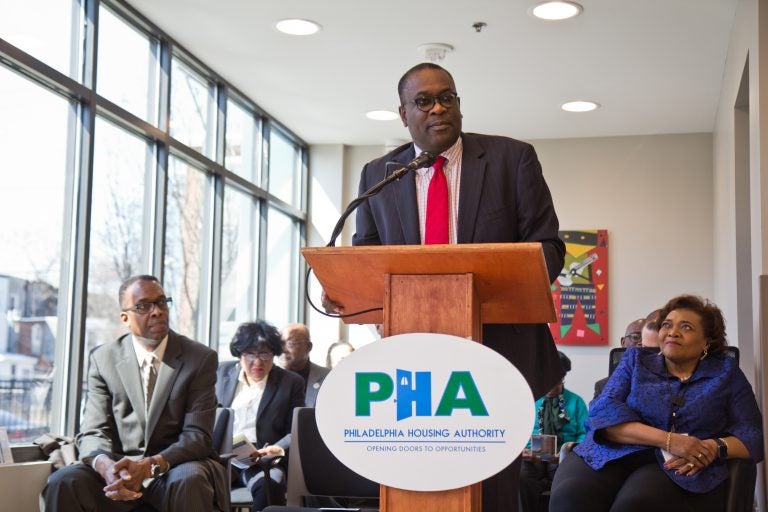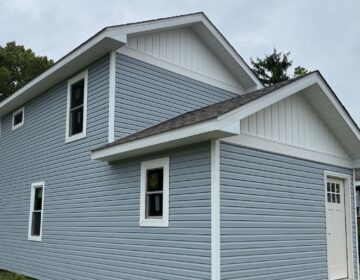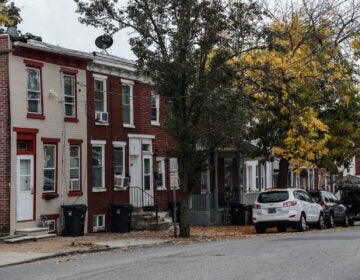Why moving people into vacant PHA homes isn’t a solution to Philly’s housing crisis
“Shifting the order of names on a waitlist is not a solution but rather an unjust, unethical, and illegal act,” writes PHA CEO Kelvin A. Jeremiah.

Philadelphia Housing Authority president Kelvin Jeremiah spoke at the opening of the Sharswood Tower. (Kimberly Paynter/WHYY)
The Philadelphia Housing Authority (PHA) stands ready to work with local neighborhoods as the real estate landscape shifts and the economy recovers from COVID-19. It is essential, however, to first define that role and understand what PHA does, has done and can do.
As the largest landlord in Philadelphia, serving over 80,000 people, PHA is directed to provide safe, decent affordable housing for the city’s low-income residents.
A legislatively created Commonwealth agency, PHA receives over 95 percent of its funding from the federal government, which regulates and monitors its actions. It is the City of Philadelphia – not PHA – that receives federal funds for providing transitional and homeless housing.
Recently, a protest encampment in Sharswood has given new urgency to issues of homelessness and affordable housing and stirred confusion regarding PHA’s mission.
In our conversations with public officials and encampment leaders, everyone agrees that there is a significant need for affordable housing in Philadelphia and that demand is likely to grow.
Protest leaders have suggested that PHA bypass the 40,000 low-income Philadelphians now on PHA’s waitlist and direct the housing slated for them to those living in the encampments.
Activists have taken it upon themselves to move families they select into vacant PHA properties — whether habitable or not — a plan that allows those they select to skip the waiting list, and bypass federal requirements.
Shifting the order of names on a waitlist is not a solution but rather an unjust, unethical, and illegal act.
If the goal is to accommodate more of the deserving families in this city, then we need to find additional funding and public and private partners willing to expand and refurbish the affordable housing stock.
Ultimately, PHA’s actions are restrained by budget limitations, which is why the waitlist for housing has been closed for years while the backlog is addressed.
The quickest path forward is to intensify the focus on legislative action. Elected officials at every level must be persuaded that affordable housing is a community priority. And residents who have not yet done so must fill out the 2020 Census form, which helps to determine representation in Congress and distribution of federal funds.
PHA, through its 2020 annual contribution contracts with the Department of Housing and Urban Development (HUD), which sets funding, expects to bring 650 new, low-income affordable units to Philadelphia in the near future.
Since the current PHA administration began in 2013, it has invested over $74 million to rehab and reoccupy long-term vacant and blighted housing and has built seven award-winning affordable housing developments. Additionally, PHA has worked with more than 20 partners to build over 2,500 units of affordable housing, with much more in the works.
Beyond where people live, PHA cares how they live. It has worked to develop a mutually respectful synergy with its residents, actively listening to them and to those in the community. In concert with these stakeholders, PHA is providing job training, healthcare, educational opportunities, scholarships, and ways to move up and onward in life.
Knowing that so many of our communities are disproportionately ravaged by poverty, gun violence and health care issues that result from racial discrimination and neighborhood disinvestments, PHA and its engaged resident-leadership work together with an intentional focus on equity and social justice that is reflected in community aspirations and initiatives.
Neighborhood leaders in Sharswood are counting on PHA to move forward with plans for a $52 million shopping center on the encampment site. It will have a grocery store, bank, urgent care and 100 affordable housing units.
Any further delay in making these improvements risks undermining the Sharswood community’s trust in the process and ignoring the will of PHA’s resident leaders. Allowing individuals to use protest to rise to the top of a waitlist for permanent housing does not expand existing affordable housing options nor is it fair.
This strategy simply delays efforts to expand low-income housing and disregards the expressed needs of a community that has waited for far too long and deserves a better way of life.
Kelvin A. Jeremiah is the President and CEO of Philadelphia Housing Authority.

Subscribe to PlanPhilly
WHYY is your source for fact-based, in-depth journalism and information. As a nonprofit organization, we rely on financial support from readers like you. Please give today.







